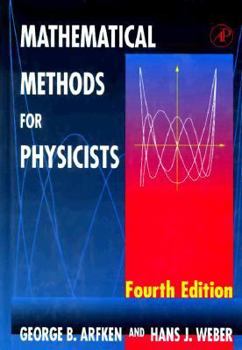Mathematical Methods for Physicists
Select Format
Select Condition 
Book Overview
This best-selling title provides in one handy volume the essential mathematical tools and techniques used to solve problems in physics. It is a vital addition to the bookshelf of any serious student... This description may be from another edition of this product.
Format:Hardcover
Language:English
ISBN:0120598159
ISBN13:9780120598151
Release Date:October 1995
Publisher:Academic Press
Length:1029 Pages
Weight:3.75 lbs.
Dimensions:2.2" x 6.6" x 9.6"
Customer Reviews
5 ratings
Consider it for what it is
Published by Thriftbooks.com User , 17 years ago
This is a 1000 page supplement to other textbooks or courses, and works best when combined with an instructor that knows the material in depth. Personally, this book was a required text for an intro to theoretical physics class that I took a few years ago, and combined with the instructor's lectures that were partially supplemented by other authors (Boas), I learned quite a bit. Now I am in graduate school and I am still coming back to this book as a solid reference for bessel (and other special) functions, complex variables, etc. This book has many problems, a lot of them have solutions, and most of the time you can determine for yourself if you have the correct answer. I would say a great strength of this book is the difficulty of the problems. Sure, it will take some time to work through them to a solid solution, but in doing the problems in Arfken and Weber I've found I had more depth in understanding after finding solutions. Other textbooks will have loads of problems all with very little differences. You have to actually think to solve the problems contained within this book, which will sharpen your mind for quickly solving problems that you otherwise might not attempt. At least that has been my experience.
Great text for reference and learning
Published by Thriftbooks.com User , 20 years ago
I noticed that most student reviews seemed to disparage this book as a textbook, so I am writing this to provide an alternative veiwpoint. My intermediate Math Methods class used this book and I have not yet enountered a math problem in any of my grad classes that I couldn't use this book as an aide to solve. The book is clear yet concise, which allows for a large breadth of material to be covered in one semester effectively. Yes, some material is not covered with great depth, but I think that Mathematical Methods Books by design are not meant to be thourough, mathematically rigourous books but rather books that will present the method of solving, if not the exact solution, of most problems one might encounter in the physical sciences.I reccomend this book. Like all other Math Methods books I have seen it will require other texts as supplements if one wants a reference for every problem one could encounter.
Praise from an industry physicist
Published by Thriftbooks.com User , 23 years ago
I invite the students on this page to take, or at least appreciate, a long-term view. Arfken pays off in the working world, with its comprehensive coverage of topics, short self-contained discussions which don't require a lot of flipping back and forth to other chapters, a clear writing style, and few proofs to get in the way. When I need to tackle a new problem which results in a coordinate system, function or technique that I'm rusty on, Arfken is usually the first book I pull off the shelf. Properties of Chebyshev polynomials for filter theory, or elliptic functions for the current density on a microstrip transmission line? Integral transforms? A comparison of Green's functions in 1, 2 and 3 dimensions for different electromagnetic diff eq's, all in one table? Group theory for certain phased-array antenna analyses? (really!) Tensors for analyzing flexure in superconducting magnet structures? Error functions for communications theory? It's all here in a quickly digestible form, with enough depth to solve a problem or at least prepare you to turn to a specialty text and quickly extract what's needed.I always learn something from the examples, which typically apply the same mathematical tool for my problem to some completely different area of physics. Arfken may not be an optimal text for a one-year course, but it's been my reliable working companion for 24 years. When my 2nd edition finally falls apart, I'll probably replace it with a new one.
Great for self-teaching. Arfken uses the Socratic method.
Published by Thriftbooks.com User , 25 years ago
I am an M.S. in physics and use the book for reference and filling in the gaps in my knowledge. In each section, Arfken teaches the bare essentials and then asks the student to work out the rest of the body of knowledge in the exercises. Each new theorem or principle is clearly developed in small learnable steps, and the student has the feeling of Developing Physics, instead of just learning about it. Most exercises are of the type "Prove that statement (or equation) X to be true", so the student doesn't have to worry too much about numerical answers. Each exercise or topic is carefully built on the foundation of what went before. When finished, I *really understand* the deeper issues of the topic.Dr. Arfken's perspectives on the subject matter also open up entire new worlds to explore. Many times, at the end of an exercise, I realized I had just proven a statement of which I had always wanted to see the proof. There is a strong Aha! content to the entire book.
Good book! Nothing is "easily shown that...."
Published by Thriftbooks.com User , 25 years ago
This book is excellent when used in conjunction with a book like Mathews and Walker "Mathematical Methods for Physics and Engineering". The Arfken book has problems that are oriented to the student taking a mathematical physics class for the first time. I highly recommend it to anyone teaching that type of class.




